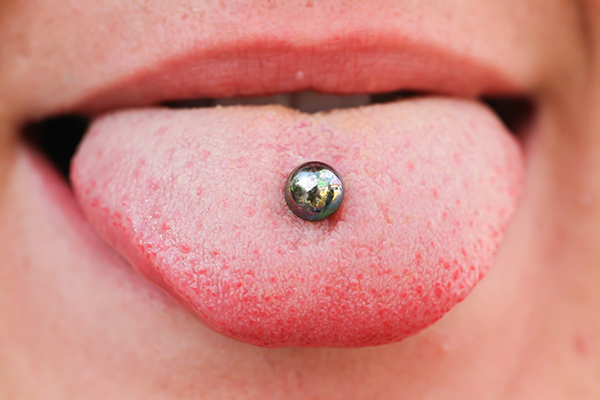While they’re not too common, tongue piercings have become more popular in recent years, especially for teenagers and young adults. Like any piercing, getting your tongue pierced involves a responsibility to properly care for it to avoid the inherent risks. However, the sensitivity of your gums and teeth, along with the constant existence of bacteria in your mouth, make this unique piercing a riskier proposition. If you’re considering getting your tongue pierced, read these facts about the risks and some tips to avoid damaging your mouth.
Common Ways Tongue Piercings Cause Damage
There are several ways that tongue piercings can cause damage to your mouth, and not all of them are obvious. The type of piercing you have will change its impact on your mouth, but studies have shown that any tongue piercing negatively impacts your dental health. Here are a few of the most common issues you may have to deal with when getting your tongue pierced.
Direct Tooth Damage
Frequent contact between the metal piercing and your teeth causes significant tooth damage over time. This can range from small chips to full on cracking. Especially with larger barbell piercings, biting down on the metal can cause a painful crack in the tooth that may damage the nerve endings. It often becomes necessary to repair this damage through a root canal procedure.
Gum Recession
Barbell piercings tend to rub against your gums, which can cause irritation and lead to gum recession. This is referred to as “localized periodontal disease,” and is a serious risk. Periodontal disease is the leading cause of tooth loss in adults, and a barbell piercing significantly increases your risk of experiencing disease.
Diastema (Space Between Upper Front Teeth)
It’s not uncommon for people with tongue piercings to play with them, sometimes by pushing the metal up between the tooth top front teeth. Over time, this small amount of force moves these teeth apart and creates a noticeable gap. This force isn’t unlike orthodontic treatment with braces, and is a great concern for dentists when they see younger patients with tongue piercings.
Infection
Just like any piercing, there is a chance of infection in the wound created by the act of piercing the tongue. While preventative dental care can help, it is far more difficult to care for your piercing in the pivotal early weeks of healing to prevent infection than piercings like those in your ear. With the consistent presence of bacteria in your mouth, it’s crucial to keep track of the piercing to catch any signs of infection as early as possible.
Nerve Damage
It’s not uncommon for individuals that have recently pierced their tongue to experience a period where their tongue is numb. In most cases, this is temporary. However, it can be a permanent effect of nerve damage done by the piercing. This nerve damage not only affects the feeling of the tongue, but can also affect your sense of taste and how your move your mouth.
Allergic Reaction
Some people experience an allergic contact dermatitis with a tongue piercing. This hypersensitivity reaction to the metal of the piercing can cause swelling or even a rash on your tongue. The severity of this reaction differs from person to person, but it’s a risk that has the potential to lead to complications requiring medical intervention.
Tips to Avoid Tongue Piercing Damage
Preventing damage and complication from your tongue piercing isn’t difficult, but it requires conscious effort and routine towards minimizing threats to your dental health. We have a few tips that can aid the healing from your piercing, as well as reduce the potential for damage over time.
#1 Choose the Right Piercing
There are many types of tongue piercings, though barbells and rings are the most common. When choosing your piercing, make sure that the style and size fit well with the location you’ll be having it placed. An exceptionally large piercing will significantly increase your risk for complications, as well as increasing the disruption to your ability to eat and speak.
#2 Keep A Thorough Dental Care Routine
The best way to reduce infection and complications is to keep your mouth as healthy and clean as possible. Consistent brushing, flossing and rinsing with mouthwash helps minimize the bacteria in your mouth thereby protecting your piercing. This is most important in the first three weeks following your piercing.
#3 Don’t Play with Your Piercing
Especially as you grow used to your new piercing, the discomfort or new feeling can cause you to “play” with the piercing by rubbing it against your teeth, gums, or roof of your mouth. This irritation instigates tissue damage and wears away at your teeth.
#4 Communicate with Your Dentist
Your best ally in dental health is your dentist. When you plan on having a piercing, and when you may have questions or concerns with caring for it, consult them as soon as possible. Not only can they help you fully understand the decision to pierce your tongue, they can help you identify possible signs of damage or infection caused by a piercing.
Contact Walbridge Dental
Don’t let a tongue piercing impact your dental health. If you’re thinking about getting a tongue piercing or need help caring for one you already have, the professionals at Walbridge Dental provide complete family dental care to families in the Millbury community. Contact us online to set up an appointment now or call us at 419-836-1033.
Connect on Social Media!

